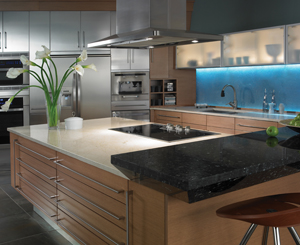How to Treat Granite Countertops
As the most sought-after countertop surface, granite has a well-earned reputation for durability and beauty. Every slab features characteristics, colors and veins that make them unique, even among the same variety. Protecting your granite with proper sealing not only protects this natural beauty but also the look of your kitchen as well as your health.
 What to Know About Granite Countertops
What to Know About Granite Countertops
Granite is a natural stone that is quarried in one solid piece. Unlike cultured marble and quartz — which are crushed and mixed with additives — your granite countertops are solid stone cut from a slab. They are undeniably durable, and they are resistant to heat and cold.
Granite is porous, which means it’s not durable against wear and tear from harsh chemicals. Keep in mind that in kitchen and bath parlance, “harsh chemicals” don’t only refer to abrasive cleansers. It also means substances such as red wine, vinegar and more.
Sealing Your Granite Countertops
The good news is that you can treat granite countertops and protect them against stains and wear with sealing. “Sealing” may conjure up images of sticky wax or heat, but it is actually a liquid you can apply with a soft cloth. It dries overnight, and many find that two coats are sufficient to protect your granite countertops for up to 2 years. Even in the largest kitchens, wiping down your countertops only takes a few minutes. Because sealing is so fast and easy, you can easily do it yourself.
To begin, remove everything from your countertops. Clean off all crumbs and sticky spots with a water-soaked paper towel. Apply the impregnator to a soft cloth — an impregnator is a solvent-based sealer — and wipe the full surface, including around the edges. Try not to splash your cabinetry with the sealer. Let it dry completely for about a day, and then reapply for the best results.
For safety’s sake, avoid placing food or other kitchen items on the counter while the granite is drying. Keep in mind that you’ll still have to wipe up spills right away. Granite sealant does not make your countertop stainproof, but it does give you more time to wipe up tomato juice or vinegar — substances that can damage granite quite easily.
The Risk of Not Sealing Granite
Remember, granite is porous. If you don’t clean your countertops regularly, that could be a recipe for sickness. Foods left on the countertop that damage the surface may leave bacteria in the pores, and could potentially spread food-borne illnesses to your family.
The bottom line? Seal your granite to assure its lasting beauty and the health of your family.